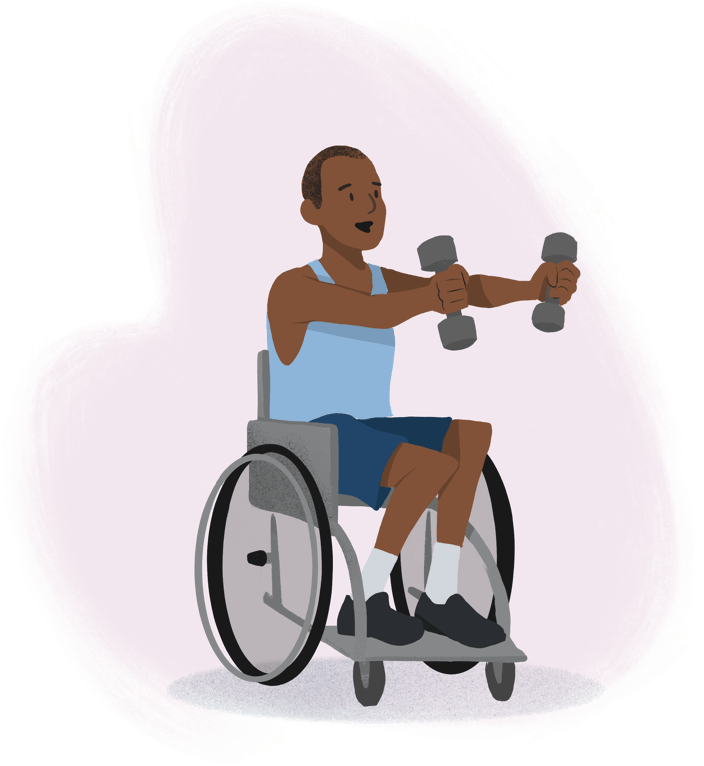For US residents only
Collaborate to create your plan
There are things you can do to supplement the treatment plan you’ve established with your doctor. Learn how diet, activity, and mental health support can also factor into your disease management strategy.
Vanessa
Diagnosed with LOPD at age 54

Pompe disease management considerations
Your healthcare provider (HCP) should be your go-to resource for Pompe treatment options and supplemental management
Disease management should consist of Pompe treatment along with a nutritional plan, appropriate amounts of activity, and mental health support
Every individual’s plan should be assessed and modified on a case-by-case basis
Can Pompe be treated?
Before there were any approved treatments for Pompe disease, the outcomes for diagnosed individuals were considerably worse than they are today. But since therapies became available in 2006, the treatment landscape has shifted in a big way.
Currently, enzyme replacement therapy (ERT) is the only FDA-approved treatment for Pompe disease. In ERT, the goal is to replace the missing GAA by additional enzyme into the bloodstream. The infused enzyme must then travel to the cells and into the where it is needed to break down

In addition to ERT, people living with Pompe often take a broader approach to their disease management. A typical care team can consist of several specialists, including:
- Pulmonologists
- Neurologists
- Genetic specialists
- Cardiologists
- Speech pathologists
- Nutritionists
- Physical therapists
- Mental health professionals
Food for function
Proper nutrition is a critical component of managing Pompe disease. Specifically, a high-protein diet may be beneficial for building and maintaining muscle mass, while also reducing glycogen buildup in cells. Carbohydrate consumption may be spaced out in small, frequent portions throughout the day. This may help to prevent glycogen buildup without creating spikes in blood sugar.
Some people with Pompe may experience difficulties in chewing and swallowing their food. For these individuals, adding supplements or using a feeding tube may be considered to provide the body with the nutrients it needs.

Nutritional recommendations for people with Pompe emphasize the importance of a high-protein diet and appropriate amounts of fats and carbohydrates. Be sure to talk to your doctor before making any changes to your diet or nutritional plan.

How can Pompe affect digestion?
Learn how Pompe can affect the muscles involved in eating, and get tips for managing the digestive symptoms it can cause.
How Nutrition Fits into Your Pompe Plan
Watch a dietitian who specializes in working with people with Pompe disease, Surekha Pendyal, MSc, MEd, RD, and Ryan, a person living with Pompe, discuss the importance of proper nutrition for managing Pompe disease.


Stay Active
Regular activity can be beneficial for everyone, but this is especially true for people with Pompe. That’s because regular activity has been shown to help with mobility, and may even help in maintaining muscular function.
However, it’s extremely important that any type of activity routine is customized to each person’s abilities and comfort level. Something that seems simple to one person can be daunting or even impossible to another. Always consult with your doctor before starting an activity program. With that in mind, there are a number of activities that can be considered, including:
Light aerobic activities, such as walking or swimming
Light strength training to engage specific muscles
Flexibility training, such as stretching or yoga
For some people, activity can mean something as simple as standing up and walking around their home—and that’s OK. The most important thing to remember is that it should be beneficial, not detrimental.
How Regular Activity Fits into Your Pompe Plan
Watch a physical therapist who specializes in working with people with Pompe disease, Jenna Lammers, MSR/PT, CNT, PCS, and Vanessa, a person living with Pompe, discuss the importance of staying active for managing Pompe disease.
Mental health matters
Psychological support and well-being can make a world of difference when managing Pompe disease—and not just for those living with it. The mental burden of Pompe disease can be challenging for all involved, including caregivers and family members.
If you or someone you know needs support to help cope with Pompe, a number of advocacy organizations may be able to assist you. The Pompe disease community is full of people who are familiar with experiences like yours. You can also express your mental health concerns to your care team, who will be able to help or refer you to someone who can.
For mental health guidance and information on the types of support available to people with Pompe disease, you are encouraged to visit Pompe Alliance

In a survey, the majority (97%) of caregivers said they gained “some satisfaction” when providing care for someone with Pompe, compared to 50% of caregivers who said they experienced mental health problems when providing care for someone with Pompe.
Data gathered from a survey conducted to assess the toll that Pompe disease can take.

My writing is important to me because I feel like it’s a form of therapy and something that I can leave behind like a legacy.

Mental Wellness: A Guide for People Living With Rare Diseases
Provides information about how rare diseases affect mental health, along with resources and suggestions for finding support.
The importance of monitoring
Current guidelines recommend regular testing and frequent evaluation of Pompe disease. According to guidelines, people living with Pompe disease should receive muscle and functional testing upon diagnosis, in addition to regular follow-up testing.
You are encouraged to work with your care team to ensure that the tests listed below and others are being conducted regularly over the course of your care.
Routine evaluations for people with Pompe include:
- Muscle tests, strength tests, and pain scores
- Breathing function by a physical exam or
- Health-related quality-of-life measures
Specific tests used to measure disease progression include:
- Six-minute walk test (6MWT): Assesses how far a person can walk over a 6-minute time period, which is a standard measurement of mobility
- Forced vital capacity (FVC): Measures the amount of air a person can exhale after taking a deep breath, which is a standard measurement of breathing function
- HEX4: A marker of glycogen accumulation in cells that can easily be measured in urine samples
- Creatine kinase (CK): A test used to evaluate muscle damage
Pompe Discussion Driver
Explore an interactive tool that can help you prepare for your next appointment. Easily track your symptoms, changes you may be experiencing, and get help with asking your healthcare team the right questions.

Now that I have my diagnosis, I work with a variety of doctors to help me move forward with LOPD. I can now put together a plan for my life. I can set goals. Goals that are achievable.
Take on Pompe today
While these disease management strategies can be a good addition to your Pompe regimen, they should not take the place of the treatment prescribed by your doctor.
Pompe disease may be a part of your story. But by incorporating a management strategy into your routine, you can have a say in what your next chapter might look like.
Stay Connected
Sign up to get the latest Pompe disease news and supportive information from Amicus Therapeutics.
Hear from others with Pompe
Read real stories from others living with Pompe.
